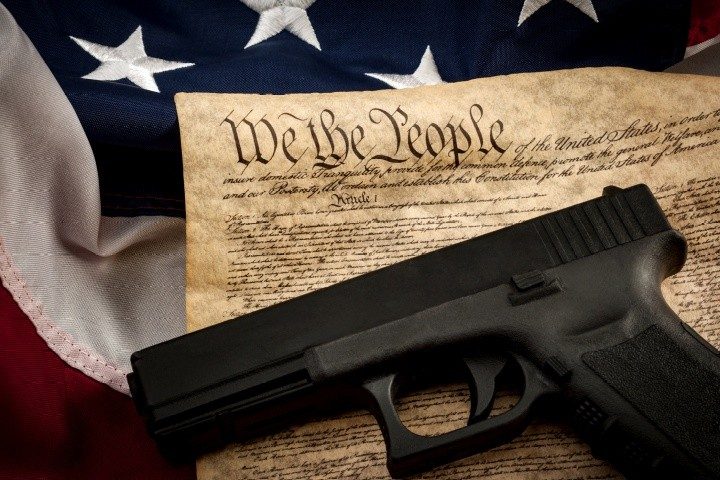
The Left is clamoring once again for more gun control, but the tide may have turned against them at the federal level as the courts peel away at unconstitutional policies that had been forced on Americans.
In the latest blow to the White House’s gun-control agenda, the 5th U.S. Circuit Court of Appeals on Thursday ruled that a federal law prohibiting people who are under domestic-violence restraining orders from owning firearms is unconstitutional.
The decision was reached by the court’s three-judge panel. Judge Cory Todd Wilson, who wrote the court’s opinion, was appointed by President Donald Trump, as was Judge James Ho — who wrote a concurring opinion. Judge Edith Jones was appointed by President Ronald Reagan.
In the case ruled on by the court, Texas police had found a rifle and pistol at the home of a man who was subject to a civil protective order to keep him from harassing and stalking his ex-girlfriend and their child. Under the order, the man was forbidden from possessing firearms.
The man pleaded guilty after being indicted by a grand jury. But he later challenged his indictment on the argument that the law keeping him from owning guns was unconstitutional.
Initially, the 5th Circuit Court had ruled against the man. However, things changed drastically last year when the Supreme Court issued a landmark ruling in the case New York State Rifle & Pistol Association v. Bruen, which set new standards for the Second Amendment — standards stating that in formulating gun laws, the government must demonstrate they are “consistent with the Nation’s historical tradition of firearm regulation.”
As a result of the Supreme Court’s ruling in Bruen, the 5th Circuit Court withdrew its decision, ruling instead on Thursday to vacate the man’s conviction and hold that the federal law he had broken is unconstitutional.
“Through that lens, we conclude that [the law’s] ban on possession of firearms is an ‘outlier’ that our ancestors would never have accepted,” the 5th Circuit said.
On Thursday evening, the Justice Department stated that it plans to appeal the ruling. In a statement, Attorney General Merrick Garland said, “Whether analyzed through the lens of Supreme Court precedent, or of the text, history, and tradition of the Second Amendment, that statute is constitutional. Accordingly, the Department will seek further review of the Fifth Circuit’s contrary decision.”
CNN reported:
The Justice Department did not specify its next step in seeking review of the ruling, which could include asking the 5th US Circuit Court of Appeals for an en banc rehearing by all the judges on the court, or asking the US Supreme Court to take up an appeal.
… The 5th Circuit panel was not persuaded by the historical parallels put forward by the US Justice Department, which was defending the conviction of a person who possessed a firearm while under a domestic violence restraining order that had been imposed after he was accused of assaulting his ex-girlfriend. The Justice Department argued that the domestic violence law was analogous to 17th-and 18th century regulations that disarmed “dangerous” persons.
… “The purpose of these ‘dangerousness’ laws was the preservation of political and social order, not the protection of an identified person from the specific threat posed by another,” the 5th Circuit opinion read. “Therefore, laws disarming ‘dangerous’ classes of people are not ‘relevantly similar’” to “serve as historical analogues.”
One critic of the Thursday ruling was California’s Democrat Governor Gavin Newsom, who on Twitter panned the 5th Circuit Court for giving “domestic abusers the right to carry firearms.”
“Will they be allowing guns in their courtrooms too?” he blasted. “This deranged vision of guns for all is a direct threat to safety — and it will only accelerate.”
The latest ruling isn’t the only Second Amendment-related front on which Garland is finding himself forced to fight.
The extraordinary overreach from the Bureau of Alcohol, Tobacco, Firearms and Explosives — signed by Garland — declaring that pistols with braces are now short-barreled rifles to be registered under the 1934 National Firearms Act (NFA) is being met with lawsuits.
Garland defended his decision by saying that “keeping our communities safe from gun violence is among the [Justice] Department’s highest priorities.” Despite that assurance, there were nearly a quarter of a million negative comments from citizens during the open public-response period prior to the rule becoming effective.
The first lawsuit to be filed against the ATF came from the Wisconsin Institute for Law & Liberty, Inc. — Britto v. ATF — filed in the U.S. District Court for the Northern District of Texas.
The second lawsuit to be filed is Mock v. Garland, brought by the Firearms Policy Coalition and also presented to the U.S. District Court for the Northern District of Texas. It not only challenges the ATF for violating the APA — the Administrative Procedures Act — and the Constitution, it also challenges, for the first time in decades, the constitutionality of the NFA itself.
Moreover, the Arkansas Sheriffs’ Association (ASA) has stated that its members won’t assist federal agents who seek to enforce ATF’s new rule in their state.
“We do not support assisting the federal government in any way in the enforcing of this offensive affront to the rights of law-abiding citizens of the State of Arkansas,” said ASA’s director, Scott Bradley. “Criminals don’t obey the law, and when rules like this are put in place, they seek only to criminalize otherwise law-abiding citizens.”




